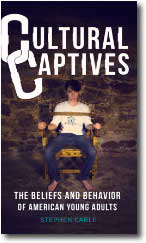Steve Cable analyzes survey data about the worldviews of young adults. The results were not encouraging.
More Cultural Research from Steve Cable
In my book, Cultural Captives, one area of focus was the number of people possessing a biblical worldview. The worldview questions formulated by the Barna Group were used in the Probe Ministries Culturally Captive Christian survey of 2010. For the other surveys used in the book, I selected a similar set of questions to define a biblical worldview for each survey. Looking across those surveys, we saw that about one in three evangelical emerging adults and about one in ten non-evangelical emerging adults held a biblical worldview.
In this post, we want to look at a newer survey to see what light it sheds on the worldviews of Americans. The survey is called Faith Matters 2011{1}, conducted on behalf of Harvard University and the University of Notre Dame. They surveyed over 2,600 people, asking them about their religion (beliefs, belonging and behavior) and their social and political engagement. The questions we used to define a biblical worldview were on: 1) belief in God, 2) belief in life after death, 3) the path to salvation, 4) inspiration of the Bible, 5) existence of hell, and 6) how one determines what is right or wrong in a particular situation.
Let’s begin by looking at how many have a biblical worldview on all of the questions above except for the question about the correct path to salvation. The results look like this (where Evan/BP stands for Evangelical or Historically Black Protestant):
| Biblical Worldview w/o Salvation Question | |||||
| Evan/BP | Not Evan/BP | All | |||
| 18-29 | 30+ | 18-29 | 30+ | 18-29 | 30+ |
| 50.0% | 54.8% | 15.1% | 21.8% | 25.6% | 32.7% |
So we see that about half of those with an Evangelical or Historically Black church affiliation take a stand on these questions consistent with biblical teaching. And, about a quarter of all emerging adults (those 18-29) take a biblical view.
Now let’s see what happens when we add the question about the path to salvation.
| Biblical Worldview w/ Salvation by Faith Alone | |||||
| Evan/BP | Not Evan/BP | All | |||
| 18-29 | 30+ | 18-29 | 30+ | 18-29 | 30+ |
| 5.1% | 2.7% | 1.4% | 2.4% | 2.5% | 2.5% |
Wow, we observe a massive reduction among the Evan/BP group from 50% down to around 5%. The question that caused this reduction was worded as follows: “Some people believe that the path to salvation comes through our actions or deeds and others believe that the path to salvation lies in our beliefs or faith. Which comes closer to your views?” The vast majority of evangelicals responding to this survey were unwilling to say that salvation is by faith alone even though the Bible clearly states this is the case (see for
example Ephesians 2:8-9).
Interestingly enough, many of the respondents volunteered another answer, saying that salvation comes through a mixture of faith and actions. If we allow this answer as well as the faith alone answer, the results for a biblical worldview look like this:
| Biblical Worldview w/ Salvation by Faith & Actions | |||||
| Evan/BP | Not Evan/BP | All | |||
| 18-29 | 30+ | 18-29 | 30+ | 18-29 | 30+ |
| 40.9% | 46.6% | 9.7% | 13.5% | 13.3% | 24.4% |
Note that in all of the cases, there is only a small difference between emerging adults and those 30 years old and older. It appears that evangelicals across the board are unwilling to fully accept the position that we are saved by faith in Jesus Christ and no set of good works is going to change that.
However, the reason may not be that evangelicals feel that they need to do some good works to become acceptable for heaven. It may be instead that they want to leave room for a pluralistic view that surmises that others, not really knowing of Jesus’ sacrifice, may be able to enter heaven because of their righteous activities on this earth. Supporting this possibility, the Faith Matters survey shows that about 80% of evangelicals believe that there are more ways to heaven other than faith in Jesus Christ.
In the Probe survey of 2010, we asked a similar question worded as follows: “Please indicate your level of agreement with each statement: if a person is generally good enough, or does enough good things for others during their life, they will earn a place in Heaven.” We found that around half of emerging adults disagreed strongly with this statement. This result correlates very well with the result from Faith Matters when we allow the answer “salvation comes through a mixture of faith and actions.” If you think about it, someone who answered that salvation comes through faith and actions could also be a person who would disagree strongly with the Probe survey statement. So perhaps the Probe survey was overestimating the number of people who correctly believed that salvation
came through faith alone.
Note
1. Data downloaded from the Association of Religion Data Archives, www.TheARDA.com, and were collected on behalf of Harvard University and the University of Notre Dame, principal investigators: Robert Putnam, Thomas Sander, and David E. Campbell.
© 2016 Probe Ministries














